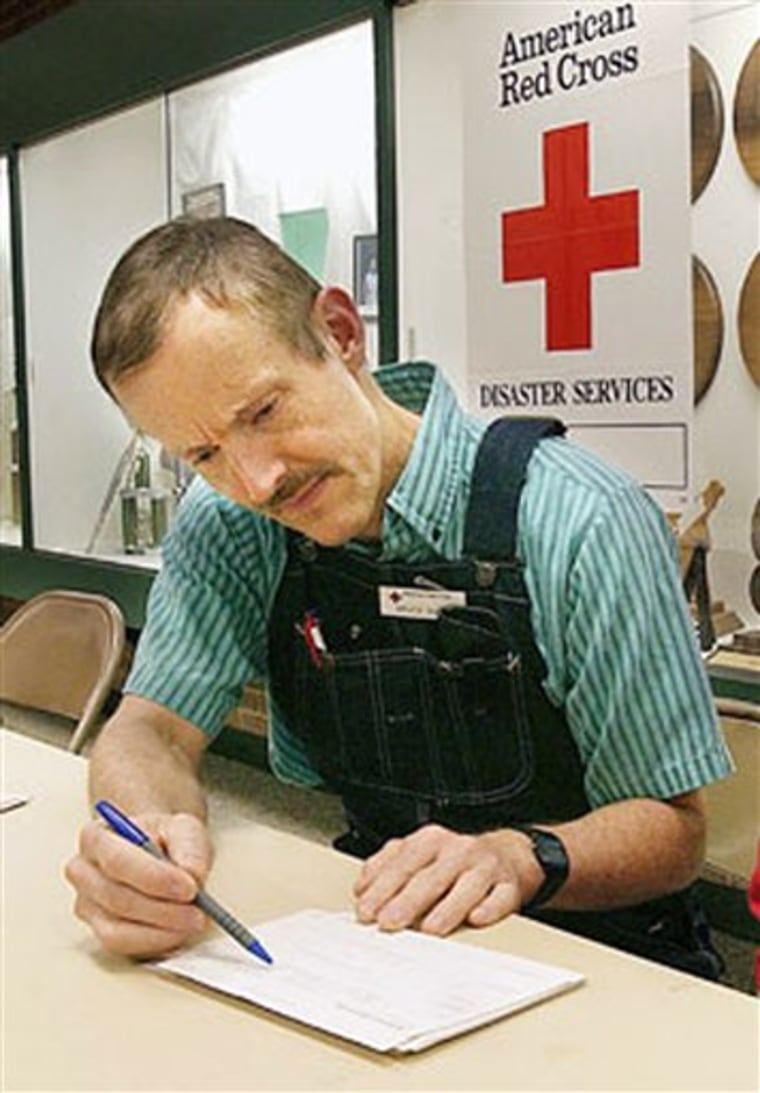Authorities investigating the 2001 anthrax attacks will begin meeting with victims’ families Wednesday to discuss the case, family members said, an indication that some lingering questions in the investigation may soon be answered.
The government is expected to declare the case solved but will keep it open for now, according to two U.S. officials who spoke on condition of anonymity because of the ongoing investigation. Several legal and investigatory matters need to be wrapped up before the case can officially be closed, they said.
Army scientist Bruce Ivins committed suicide last week as prosecutors prepared to charge him with carrying out the deadly attacks. In the past week, haunting details about Ivins’ mental health have emerged.
But several holes in the case remain. NBC's Pete Williams reported that federal officials said they'll give a possible motive on Wednesday for why Ivins sent the anthrax letters, and it involves the first Gulf War.
Officials told Williams that Ivins was stung by criticism that the anthrax vaccine he helped develop for the armed forces back then could have contributed to the medical malady known as Gulf War Syndrome, experienced by many veterans. The officials spoke on condition of anonymity ahead of a potential announcement on Wednesday.
Investigators believe a motive for sending the letters was to generate renewed interest in anthrax as a threat, and a potential domestic one, which would cause demand for the improved vaccine he worked on, Williams reported.
Some questions may be answered when documents related to the case are released, as soon as Wednesday. For others, the answers may be incomplete, even bizarre. Some may simply never be answered.
Some friends and former co-workers have expressed doubt that Ivins would have unleashed the deadly toxin. They questioned whether he could have converted the bacteria into a fine powder without anyone at the Fort Detrick biological warfare laboratory noticing.
Documents could be unsealed Wednesday
The FBI is expected to lay out much of its case for family members beginning Wednesday. Around that time, authorities are expected to ask a federal judge to unseal documents revealing how the FBI closed in on Ivins.
“We’ve been suffering for seven years,” Patrick Hogan, son-in-law of anthrax victim Robert Stevens, said in a phone interview from his home in Palm Springs, Fla. “I’m just glad they finally found somebody.”
Attorney General Michael Mukasey, at a Boston news conference on identity theft, declined to discuss details in the case.
The Justice Department “has a legal and moral obligation to make official statements first to the victims and their families, then the public,” Mukasey said. “And that’s the order in which we’re going to do it.”
Whether the documents will prove that they found the right person remains unclear.
The key to the investigation was an advanced DNA analysis that matched the anthrax that killed five people to a specific batch controlled by Ivins. It is unclear, however, how the FBI eliminated as suspects others in the lab who had access to the anthrax.
And then there’s the question of motive. Authorities believe the attacks may have been a twisted effort to test a cure for the toxin. Ivins complained of the limitations of animal testing and shared in a patent for an anthrax vaccine. But for now, it’s not clear what, if any, evidence bolsters that theory.
Sorority says it helped FBI track Ivins' contacts
Investigators also can’t place Ivins in Princeton, N.J., when the letters were mailed from a mailbox there. And the only explanation for why the married father of two might have made the seven-hour round trip is bizarre.
Authorities say Ivins was obsessed with the sorority Kappa Kappa Gamma and had secretly visited sorority buildings on several campuses. The Princeton mailbox was not far from the sorority office there.
In a statement Tuesday, the sorority confirmed it had been helping the FBI in tracking down contacts Ivins had with some Kappa chapters and members going back more than 30 years. The sorority said it had been assured that none of its chapters or members were ever exposed to biological threats or any other harms associated with the case.
Kappa executive director Lauren Sullivan Paitson said, “While we are relieved that none of our members or chapters were at risk, we grieve for the victims of the anthrax attacks and their families and, on behalf of our members, express our sympathy to all who have been personally touched by these tragic events.”
Richard Schuler, attorney for anthrax victim Robert Stevens’ widow, Maureen Stevens, said his client will attend Wednesday’s FBI briefing with a list of questions.
“No. 1 is, ’Did Bruce Ivins mail the anthrax that killed Robert Stevens?”’ Schuler said, adding, “I’ve got healthy skepticism. It’s good to be the skeptic. The bottom line is, we want to see this perpetrator brought to justice.”
